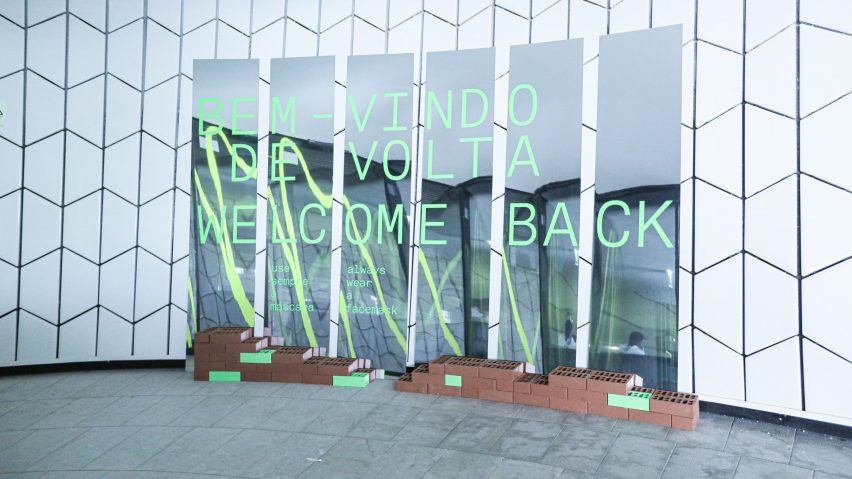Lisbon-based designer Sam Baron has created a set of signs made from bricks, tape and mirrors to encourage social distancing at the Museum of Art, Architecture and Technology, which reopened this week.
Baron created the series of interventions to allow visitors to the Amanda Levete-designed Museum of Art, Architecture and Technology (MAAT) in Lisbon to navigate around the building while adhering to social distancing guidelines.
"In order to aid our audiences to understand and respect also the more general rules of distancing inside our halls, we commissioned the design of a 'three-dimensional communication system' by Sam Baron," MAAT executive director Beatrice Leanza told Dezeen.
"It is an ingenious, simple yet very effective and fun solution that makes use of basic materials like bricks, mirrors and tape and populates all the spaces at strategic intersections to help people navigate the museum in respect of rules."
Baron designed the 3D signage system, which can be easily removed when restrictions are eased, as he wanted the messages displayed to have an impact.
"In partnership with Lavandaria, a fine printing design studio in Lisbon, the idea was to give a special touch to our signage system," Baron told Dezeen.
"We all wanted to have print material that has a 3D presence as the spaces are big, and at the same time to be modular to display the different informative signs."
The signage was made using a combination of red bricks, green tape and mirrors. Bricks with bright green arrows were used to mark a one-way system that has been implemented at the MAAT, and as weights to keep a series of mirrors in position.
Safety information has been printed on the mirrors in matching bright green.
"We paired the bricks with some mirror panels as a way to engage more with the visitors," explained Baron.
"In fact to see yourself reading some safety rules give a unique feeling of responsibility as it makes you feel truly concerned," he continued.
The material selection was also a nod towards the architecture of the ceramic-clad MAAT building and the adjacent Central Tejo brick power station.
"It is also a clear references to MAAT buildings, having in one side an old electric power station made of red clay bricks and iron structures and on the other side a very contemporary white building that mirrors the river side," said Baron.
Baron aimed for the signage to be "unexpected" and welcome visitors back to the museum, not scare them.
"We believe that to create signage for Covid, which has been in the mind of all of us for months, it was smart to give a more human-based flavour to this project," he said.
"It is not about scaring or controlling the visitors but welcoming them back, offering them a safe way to embrace culture again and feel good in a sheltered environment such as a museum."
The signage is now in place at the MAAT museum, which reopened to the public on June 10th with a maximin capacity of 161. It reopened with a museum-wide installation designed by New York architecture studio SO-IL, along with an exhibition of its work called the Currents – Temporary Architectures by SO-IL exhibition.

